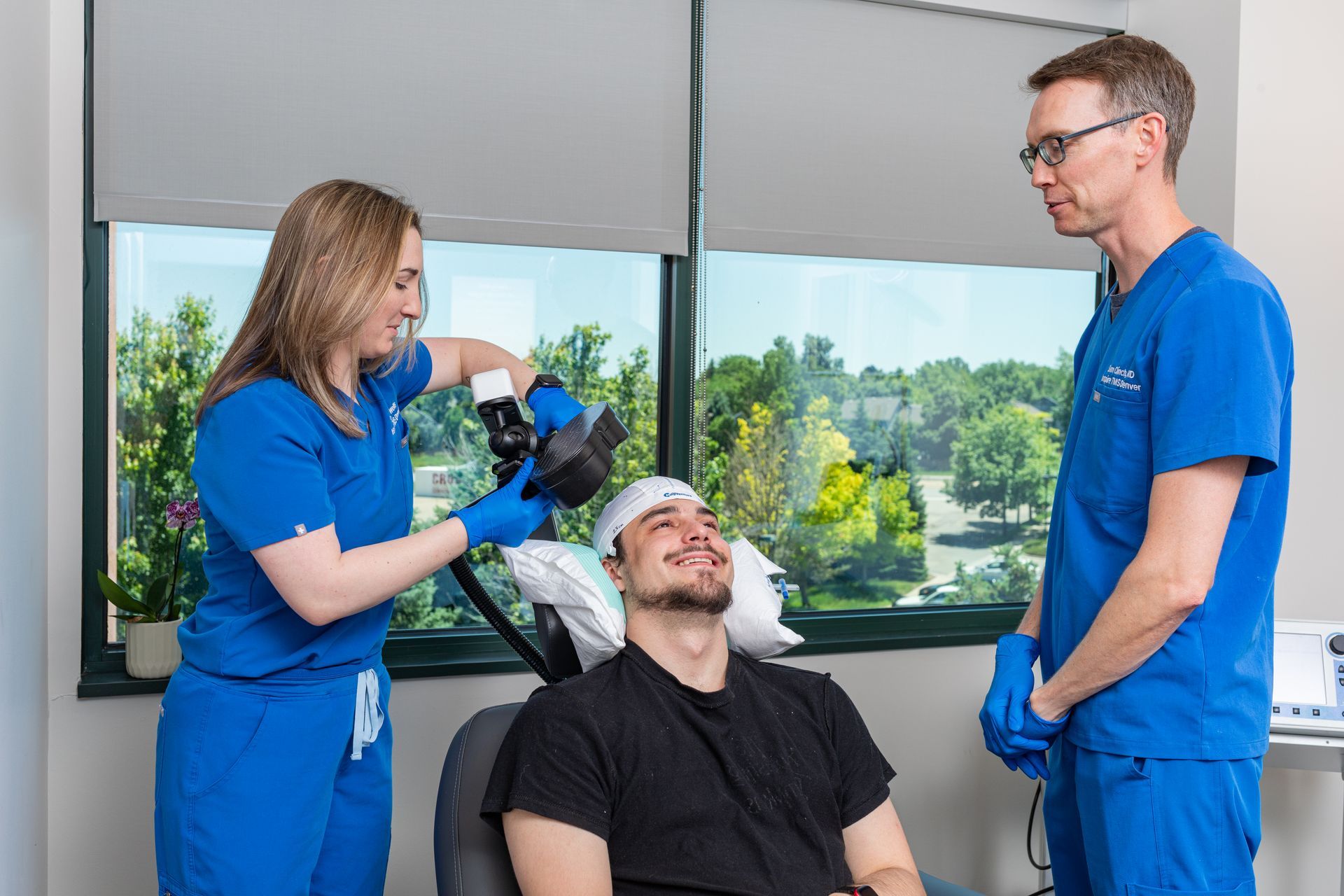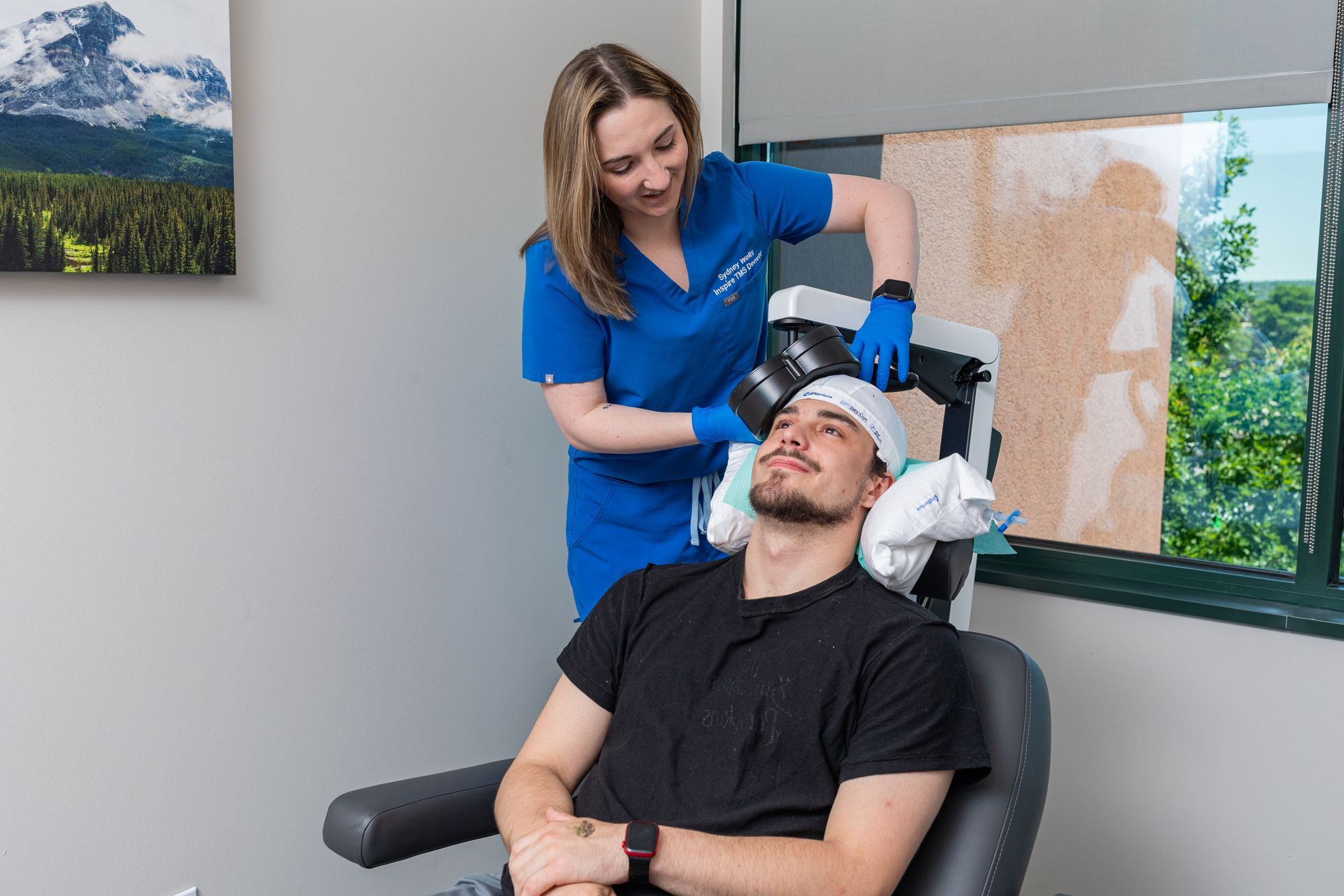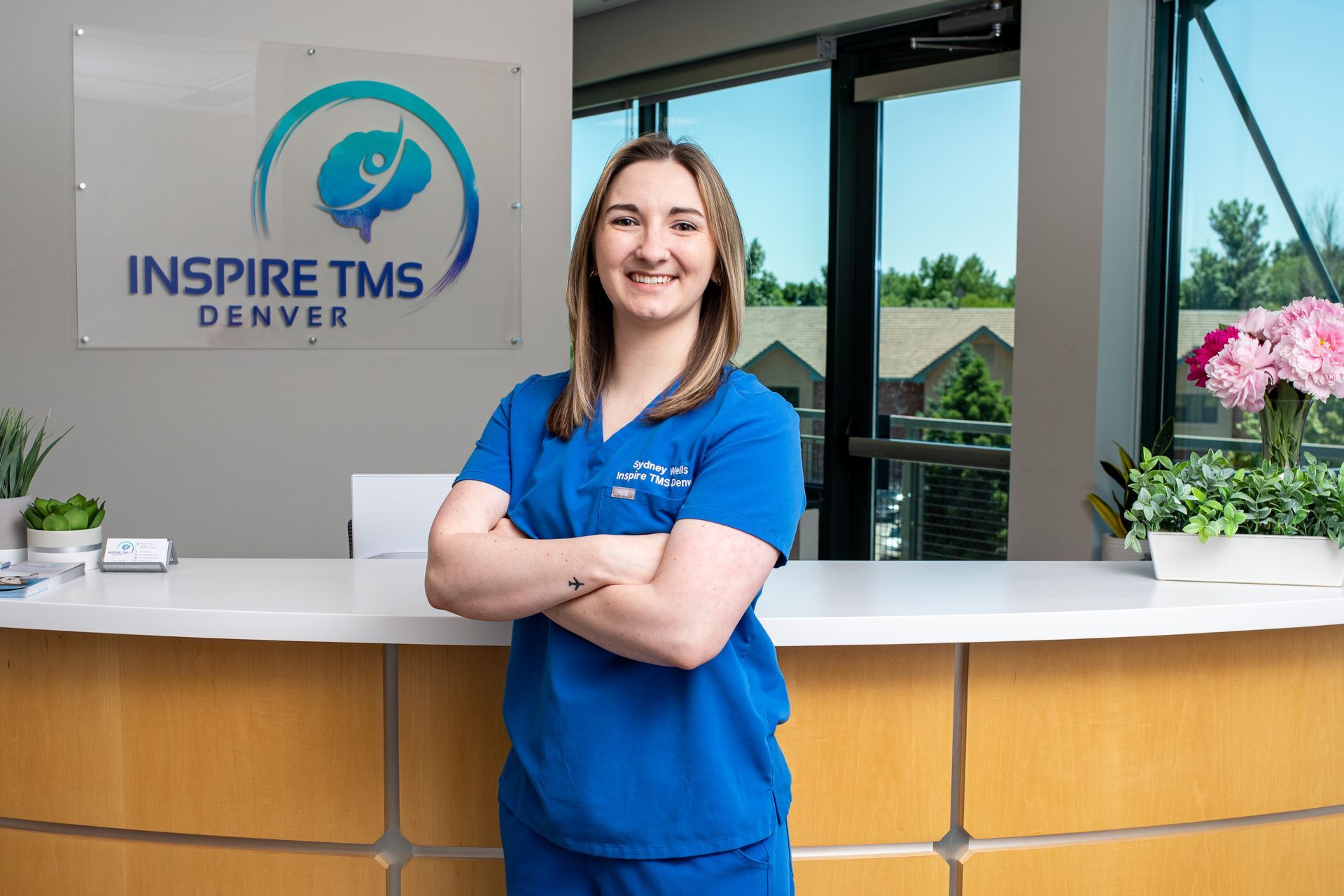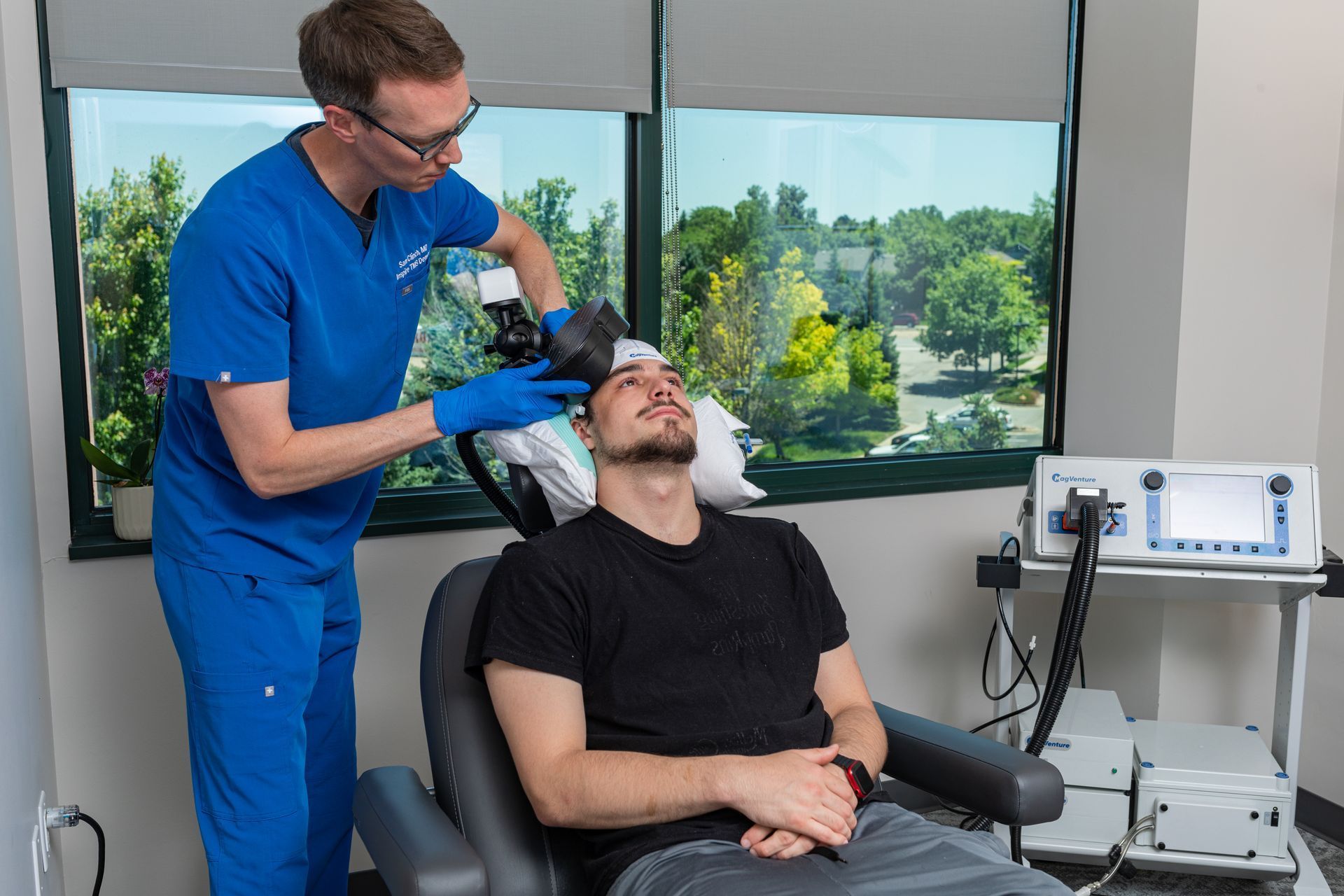12 Important Questions You Might Not Think to Ask About TMS Therapy

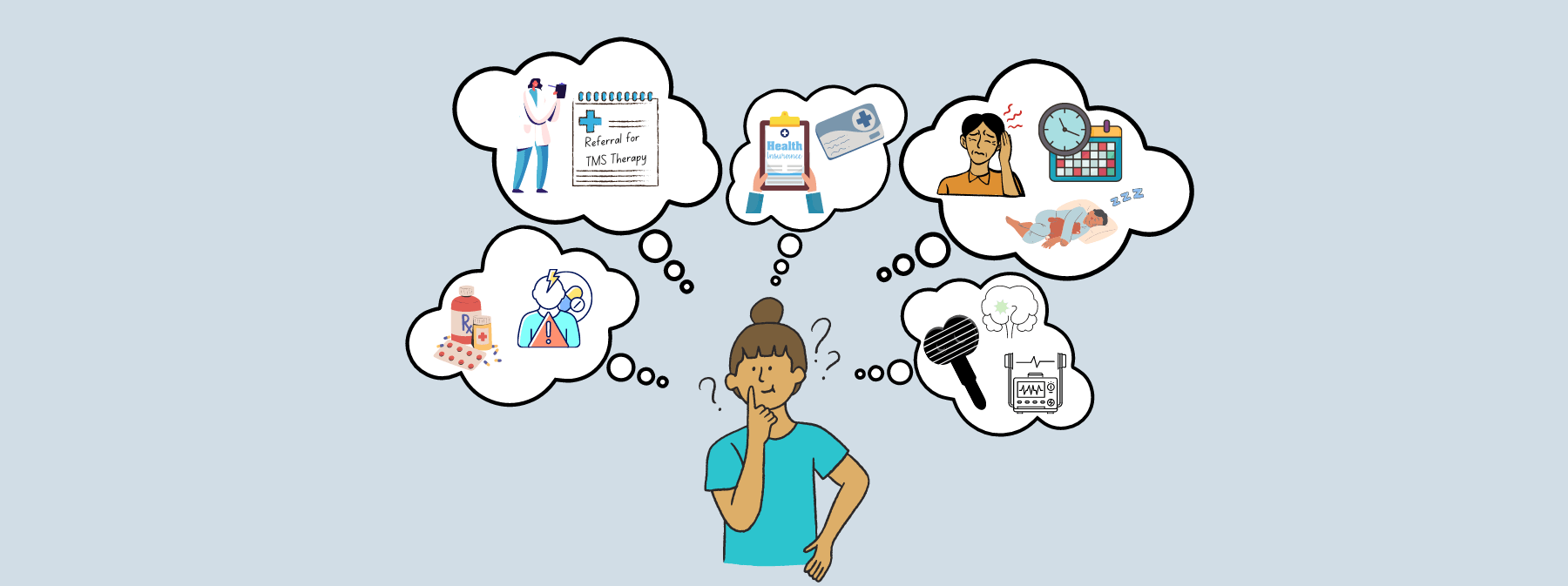
Living with a mental illness is hard, and sometimes, finding the right treatment for your mental illness can be even harder. Before trying something new for any kind of problem or illness, you’ll want to do your research. Unfortunately, finding information, and even just knowing what questions to ask, isn’t always easy. That’s why we’ve compiled a list of questions that we feel are often overlooked but incredibly important when making a decision about TMS treatment. If you have a question, but you don’t see it addressed in this post, check out our FAQ page for some of the most frequently asked questions about TMS.
1. Can I stop taking antidepressant medications before, during, or after TMS treatment?
Many patients beginning TMS therapy are often taking an antidepressant or other psychiatric medication, and a commonly encountered question is: “Can I stop taking my medications?” or “When can I stop taking my medications?” – The answer to this is: it depends.
The decision to stop taking your medications depends on many factors, but ultimately, it is a decision that should be made in conjunction with your prescribing physician. We typically recommend that patients do not make changes to their medications at the onset of treatment. The main reason we ask patients to refrain from changing their medications early on is so we can properly gauge response to TMS.
If medications are providing at least some benefit, we don’t want to lose that benefit while seeing if TMS can help as well. If a patient is experiencing a lack of response or significant side effects from a certain medication, however, tapering off the medication may be fine, with approval by the TMS physician.
2. Do I need a referral from my doctor/psychiatrist to begin TMS treatment, or can I seek treatment on my own?
No, TMS does not require a referral from your current primary care physician or psychiatrist. It can be helpful to have a verbal recommendation from your current physician when submitting for prior authorization to your insurance, but this is not essential or a requirement for approval.
3. Is it okay to miss appointments?
We highly encourage consistency when it comes to attending your treatment sessions. Life can be unpredictable, however, so missing an appointment on occasion may happen. As a result, many patients wonder what effect missing treatments will have on treatment response. While it is best to attend all 5 sessions each week until the taper, research has shown that missing treatments (infrequently) does not negatively influence the overall efficacy of treatment. (Do deviations from the 5 sessions per week schedule impact outcomes of transcranial magnetic stimulation for major depressive disorder? (brainstimjrnl.com)) So in short, it is important to consistently attend sessions, but it is also okay if you have to occasionally miss a treatment here or there due to vacation, illness, or other conflict.
4. If my depression improves during treatment, will my anxiety worsen?
Patients do occasionally report an increase in anxiety symptoms during TMS treatment, but this is not very common and typically mild. The good news is that even if this occurs, or if anxiety is already also present with depression prior to treatment, there are ways that we can treat anxiety as well. Scaling back on the intensity of left-sided treatment and/or adding in a right-sided treatment to target anxiety symptoms can be effective for alleviating anxiety. Read more about
TMS for anxiety
5. Is treatment painful?
TMS should generally not be painful. TMS feels different for each individual, so as a result, we hear varying reports regarding treatment experience. To date, we have not yet had any patients who have discontinued treatment as a result of pain or discomfort. Many patients report that the sensation of the magnetic pulses feels like “a small woodpecker tapping at their skull” or like “hair being pulled.” Some patients report that treatment can be quite relaxing or even that it feels like a massage. In addition, patients almost always report that any initial discomfort with treatment decreases following each subsequent session as the area becomes desensitized to the pulses. TMS in general, is very well tolerated. Read more about
TMS pros and cons
6. Is there a possibility that I will get worse during treatment, and if so, what will happen then? And/or what is “the dip” and how long does it last?
After reading up on TMS, you might encounter reports of patients who experienced a “dip” during treatment. During a standard course of TMS treatment after seeing an improvement in mood, some patients occasionally undergo a period where their mood lowers or "dips" again. For some, this dip in mood can be mild and short-lived, but for others it may be more intense and longer lasting. To date, we do not have a definitive scientific reason for why this dip sometimes occurs. The good news, however, is that we do see patients recover from the dip and respond to treatment.
One theory behind the dip is that when patients begin TMS treatment they often feel excited or hopeful about the potential for response from treatment, resulting in a false sense of improvement, or a placebo response. As treatment moves along, these initial feelings may dissipate, causing what some refer to as "the dip.” However, once treatment actually begins to work (which can take time), patients’ moods lift and they start to feel better again. When patients’ scores are recorded on a graph, this forms what looks like a dip around the beginning-middle of treatment. While this seems like a logical explanation for “the dip,” the ultimate reasoning for why this happens is still unknown.
7. Are there any negative cognitive effects during TMS, like memory loss, feeling spacey, or experiencing trouble with concentration?
One of the many benefits of TMS therapy is its relative lack of side effects. Unlike other treatments for mental health conditions, like medications or
ECT, TMS does not involve any systemic side effects. Multiple studies have not shown any deleterious effect on cognition short or long term. Patients occasionally have reported feeling tired or spacey early on in treatments, but we have never seen this as dysfunctional or persistent.
8. What should I look for/avoid when choosing a TMS clinic?
We recommend finding a clinic that you feel most comfortable with. You will be committing to an extended treatment and seeing providers five days a week during the initial six weeks of care plus six more sessions during the taper at the end. If you don’t feel a good connection with the TMS physician or the technicians in the clinic, we encourage finding another location. Finding a clinic that is close to you is ideal, but working with a clinic you are most comfortable with may be worth a little extra travel time if needed. You should likewise feel comfortable in the space for the clinic you choose. An open and relaxing atmosphere is best. We also encourage asking how often you will see the TMS physician. At Inspire TMS Denver,
Dr. Clinch checks in with each patient almost every day during a course of treatment.
If you have additional diagnoses outside depression such as anxiety disorders or PTSD, ask the clinic what additional protocols they provide to address these symptoms and if they charge for additional treatment outside insurance coverage.Inspire TMS Denver provides off-label treatment free of charge for indications with a solid evidence base supporting use.
9. Will TMS affect my sleep?
TMS can definitely cause changes in sleep patterns. With improvement in overall depressive and anxiety symptoms as treatment progresses, we typically see improvement in overall sleep quality and quantity. This can vary quite a bit patient to patient, however. Some patients' depressive and/or anxiety symptoms improve, but sleep patterns don’t change. Many often report initial vivid dreams and changes in REM sleep patterns. There are a number of studies looking at sleep changes with TMS and these typically indicate overall improvement in sleep quality. Check out ourTMS for Sleep Disorders page for additional details.
10. Will insurance cover TMS for depression if I also have a diagnosis of bipolar disorder or psychotic symptoms?
Unfortunately, insurance will not cover TMS for Bipolar depression or depression with psychotic symptoms. It is not to say that TMS can’t work in these conditions for some, but insurance does not reimburse in these situations. There is debate as to the overall effectiveness of TMS for these conditions, but it certainly has helped some and we likewise have seen improvement in these situations. Check out our
TMS for Bipolar Depression page for more details.
All insurances cover TMS for unipolar treatment resistant Major Depression. Some also cover OCD and smoking cessation, but this is more limited.
11. What are some of the signs that TMS is working? How long does it take for this to happen?
This can look different from patient to patient, but we often see self-reported patient rating scales improve prior to patients reporting their mood improve. The rating scales contain physiologic symptoms of depression such as appetite changes, sleep pattern disturbances, low energy, concentration struggles, etc. We often see these symptoms improve first. We also commonly hear patients describe family members indicating that they have seen improved affect from those receiving
TMS treatment prior to the patient actually feeling better. Improvements in TMS can take place after just a few sessions, but we don’t know how much this may be influenced by placebo response (improvement that may be unrelated to treatment). Studies show that definite gains can be seen by around ten treatments and most will have some response within thirty treatments.
12. Which is better: Theta-Burst or standard (10 Hz) TMS?
Neither protocol is better based on the literature. Both are forms of repetitive TMS and treat major depression. Theta burst or iTBS (intermittent theta burst stimulation ) is a new protocol with FDA approval since 2018 and each treatment is completed in just over three minutes time. Only 600 pulses of iTBS are delivered with each session. The pulse pattern is very rapid with a triplet burst of 50 Hz frequency delivered in a theta pattern. Standard TMS was approved in 2008 and utilizes 3000 pulses each session. The pulses are delivered in a slower frequency of just ten pulses per second or 10 Hz, and it takes about 18.5 minutes to complete each session.
A large study out of Canada comparing the two did not show any statistical difference in response or remission rates, nor tolerability for each treatment. Both protocols were shown to be effective, safe, and well tolerated overall. Many patients elect to utilize the quicker iTBS protocol, but either protocol may be utilized. Some insurance policies state you have to use the original protocol. At Inspire TMS Denver, we are well versed in both protocols and have seen similar results in response and remission rates with each. Check out our
Theta Burst Stimulation page for additional details on iTBS.
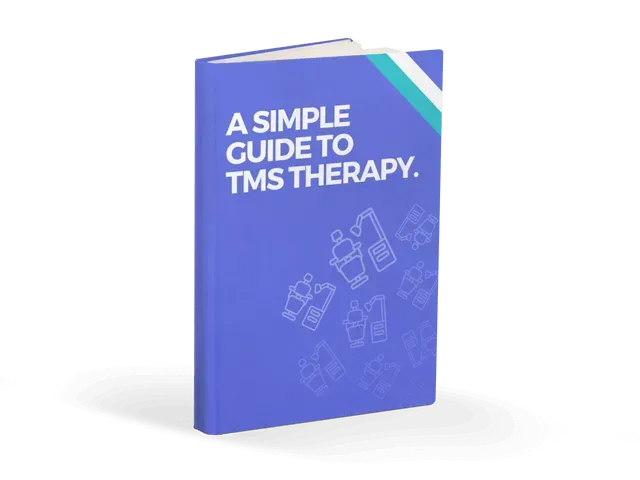
Every Question Answered
Want to know more about TMS? Check out this in-depth guide to TMS therapy with transparent and easy to understand explanations about TMS processes, protocols, and treated conditions.
Latest Posts

